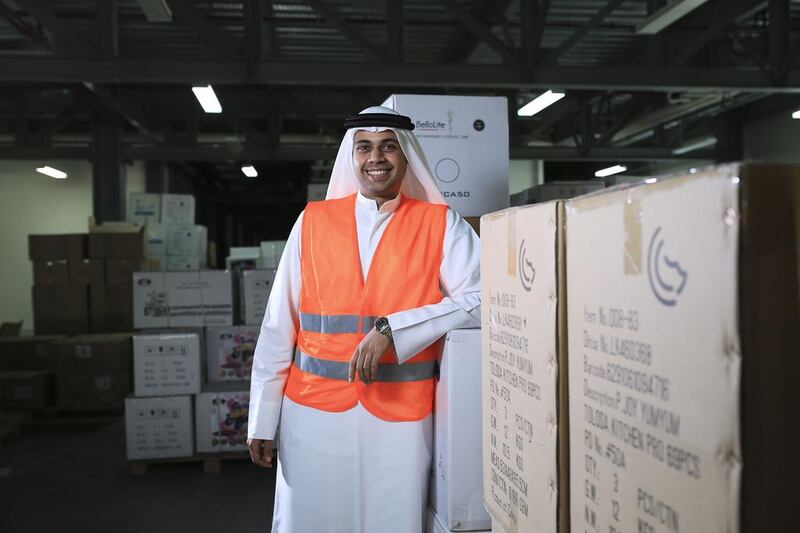After studying for eight years in the UK and gaining a doctorate in chemical engineering, Emirati Hassan Al Sayegh decided it was time to return home.
With a medical doctor father and lawyer for a mother, he admits he didn’t know it was possible to become an entrepreneur. But then his older brother left the corporate world to pursue his own venture and Mr Al Sayegh decided he too, one day, would follow suit.
And it was meeting Frenchman Idriss Al Rifai while working at Boston Consulting Group that set him on his current path as co-founder of Mena360, which helps retailers with the e-commerce component of their business.
Mr Al Rifai “was the consultant on a case and I was the intern”, he explains. “We automatically clicked. We realised we worked very, very well together.”
It was six months after Mr Al Rifai went to work for MarkaVIP, one of the UAE’s biggest online shopping sites, that he asked Mr Al Sayegh to join him in a new venture that he hoped would change the Middle East’s e-commerce landscape.
“I was sold from the beginning,” Mr Al Sayegh recalls. “I saw the potential and the gap between the e-commerce experience in the UK compared to here.”
As he points out, the UAE has a high level of broadband penetration and retail spending is considerable. Indeed, consumer spending in the UAE is forecast to exceed Dh766 billion this year, up 7 per cent from 2013, according to Euromonitor International, a London-based market intelligence firm.
“There is no reason e-commerce shouldn’t be huge here,” he says. “If it isn’t huge it’s because the e-commerce experience is still lagging behind the West. So that’s the problem we are trying to solve to make the experience as seamless as it is in more developed countries.”
Mena360 offers three services. The first is website development for companies that need a corporate web page or that want to add an e-commerce component to an existing site. The second is marketing services to drive traffic to the site. And the third is logistics; this division is called MenaVIP. Clients can opt for one or all three of these services.
“We’ll do the website, we’ll do the digital marketing and then we will also do the logistics and deliver the product to the end customer,” Mr Al Sayegh says. That’s what makes us different to other companies; all three [services] under one roof.”
The company also targets three kinds of customers: those with a physical presence in the UAE that are not yet online; those that have an online presence but want help with their e-commerce business; and international players that do not have an online store specifically for the Gulf countries.
“So if retailers are selling well [abroad], we can say to them: ‘You are doing really well in the UK, the US, Europe, why don’t you sell your stuff in the Middle East and we’ll be your logistics partner?’”
Mena360 will then either store the goods here or else deal with the last-mile delivery.
Kunal Kapoor, the Dubai-based founder of The Luxury Closet – an online marketplace for second-hand luxury goods – uses Mena360 to deliver customers’ purchases.
“Their service is a lot more personalised than other couriers,” he says. “And because they are a start-up, they are receptive to feedback and incorporate it very quickly to make the service better. They help us to build our own customised service. With other companies you just can’t do that.”
But there are challenges.
While Abu Dhabi’s new street address system will ease Mena360’s job of delivering parcels, the company currently relies on its app that allows customers to share their location with delivery staff.
Mr Al Sayegh disagrees that cash on delivery payments – which represent 80 per cent of Mena360’s transactions – rather than credit card payments, result in a higher rate of returns – an expensive process for the retailer who pays to deliver goods that are not then bought.
“People say it does cause the return rate to be a lot higher,” he reflects. “But we’ve found if you focus on lead time that really reduces the return rate substantially. When we get an order, the call to schedule the delivery happens same day and it is dispatched the next day. A lot of orders that happen online are quite impulsive so if you get to the customer ASAP the return rate is much lower – almost, not quite, comparable to credit cards.”
The first year of Mena360’s operation has been about creating a great product; this year is about winning more clients.
“The second year is going to be focused on business development and marketing our product. Most of our investment is going toward sales,” adds Mr Al Sayegh. “A lot of people know [e-commerce] will become the future. It happened in Europe, in the States and it will happen here and they want to get online before it’s too late.”
lgutcher@thenational.ae
Follow us on Twitter @Ind_Insights





